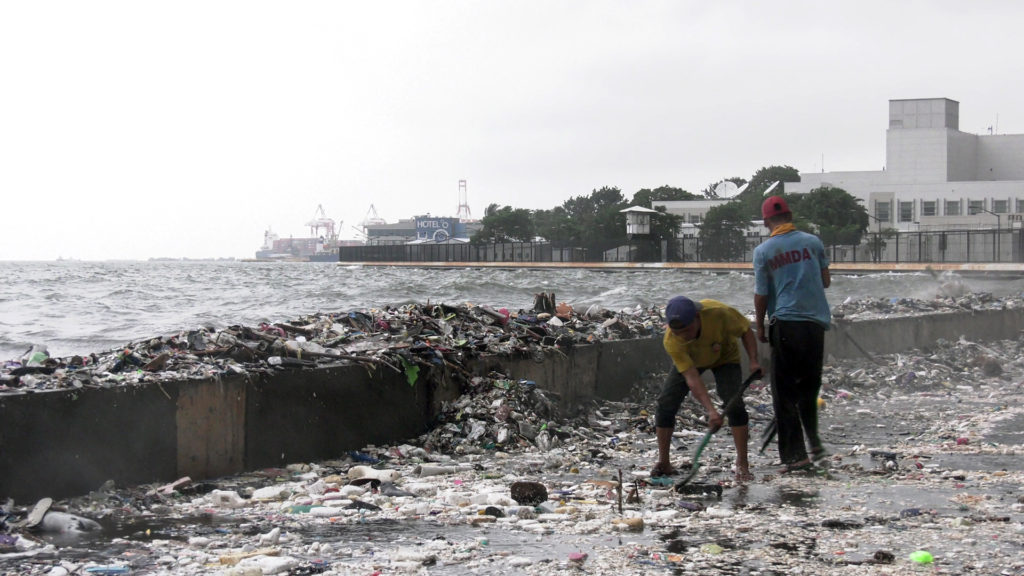Deia Schlosberg made national news in October 2016 when she was arrested and charged with 45 years’ worth of felonies for filming the #ShutItDown pipeline protest in North Dakota. She produced “How to Let Go of the World and Love All the Things Climate Can’t Change” and co-produced “Awake, A Dream from Standing Rock” and “The Reluctant Radical.” Schlosberg is currently helming “Bootstraps,” a docuseries that chronicles a two-year basic income trial.
“The Story of Plastic” will premiere at the 2019 DOC NYC film festival on November 9.
W&H: Describe the film for us in your own words.
DS: This is the story of the ripple effects of greed. Of how the entire planet is suffering at the hands of a very few number of people in the fossil fuel and petrochemical industries so that they can get rich.
And the reason those in power are able to maintain their footholds is that they’re very good at directing attention — and blame — away from themselves and back onto the people, who they Orwellianly refer to as “consumers.”
The film calls out these decades-old narratives as the distractions they were intended to be, and highlights the fact that the people most impacted — those in marginalized communities around the world — were the first to see through the ruse and the first to do something about it.
W&H: What drew you to this story?
DS: I’ve been working in the environmental justice space for years because I think that’s where the biggest potential exists to actually change broken systems — working with people who know the truth better than anyone else.
Most of my film work has focused on climate change with fossil fuels as the main driver, and this story really drew me in once I realized that it was all the same players involved. I started to recognize the playbook, the messaging, and in fact, the same product, just in a different form.
W&H: What do you want people to think about when they are leaving the theater?
DS: I want them to think, “Wow, I thought I knew that story. But I totally didn’t know that story.”
W&H: What was the biggest challenge in making the film?
DS: Well, I’m going to go with the second biggest challenge for now. But basically, the puzzle how to make this massively complicated and nuanced four-dimensional global system into a linear story.
We had a lot of false starts in terms of framing. This was a project in which embracing the process was absolutely critical.
W&H: How did you get your film funded? Share some insights into how you got the film made.
DS: The film was funded entirely through grants and donations, which went through the presenting organization, The Story of Stuff.
W&H: What inspired you to become a filmmaker?
DS: It sounds weirdly calculated, but honestly, filmmaking seemed to me like the best use of my talents and passions in order to have the greatest positive impact on the world. It was a fairly analytical conclusion arrived at in a tent in Argentina after many, many miles and years of hiking and ruminating on my purpose.
But then years into being a filmmaker, I realized that I had made tons of films as a kid at every possible opportunity and never once considered filmmaking to be a career path that I could choose.
W&H: What’s the best and worst advice you’ve received?
DS: The best is probably my mom telling me to not sacrifice the good for the perfect. And similarly, my undergrad illustration adviser telling me, “just make shit,” like, stop overthinking and just create.
And those nuggets are critical to the iterative process of filmmaking because if you know what you’re going to make before you make it, it means you haven’t learned anything along the way.
I honestly can’t think of the worst advice. I’m sure I’ve been given bad advice, but thankfully nothing that my internal compass has allowed me to follow long enough to stick.
W&H: What advice do you have for other female directors?
DS: Believe — like, do the work to truly believe — that you have worth, that your voice has value, that no one else will tell the same stories the same way you will. Other people won’t always believe in you, so it’s imperative that you do.
W&H: Name your favorite woman-directed film and why.
DS: “The Gleaners and I,” by Agnès Varda. Varda introduced me to the essay film, and what I love about that film is that it’s entirely her process and her experience and her conclusions, but there’s zero ego. She simply shares her journey with the audience and she’s so humble about it, and that makes her subjects have so much more authority.
Even while doing the humblest of things — gleaning, literally stooping — they come across as the heroes and experts that she is learning from. I think it’s brilliant and so effective.
W&H: What differences have you noticed in the industry since the #MeToo and #TimesUp movements launched?
DS: Day-to-day, not all that much, truthfully. But there’s a very clear effort on the part of organizations and funders to call for parity and representation, and that can only be a good thing — even if it’s out of social pressure, or whatever. Any evening of the playing field is a good thing.
Because people that have historically had to fight for their opportunities will squeeze every last drop out of each one they’re given. So it won’t take us very long to catch up.







